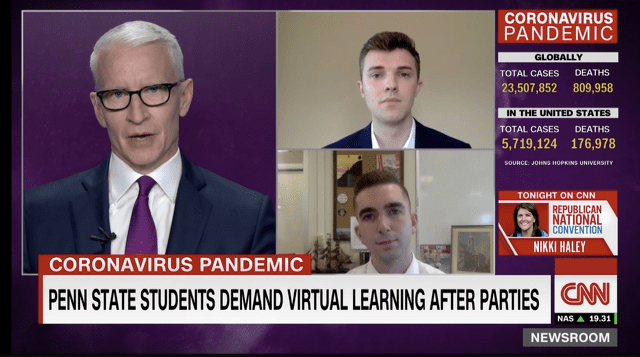Zach McKay, president of the University Park Undergraduate Association, appeared on CNN with Anderson Cooper Monday afternoon to discuss Penn State’s back-to-school plans and urge the university to move classes online and send students home.
McKay was joined by Michael Miller, founder and co-director of Penn State’s Students Teaching Students organization. The two feel the university should move to remote instruction to keep students safe — the only option, in their opinion, moving forward.
Their appearance on the news network comes after Penn State reported large on-campus and off-campus parties in the days since students returned to campus, both of which violated the university’s COVID-19 mitigation policies.
Just days after returning to campus, students outside East Halls made headlines for gathering in large groups without masks or social distancing. Two Penn State fraternities, Pi Kappa Alpha and Phi Kappa Psi, were also suspended for hosting large social gatherings in violation of a university and Interfraternity Council moratorium on Greek life social functions.
“After seeing a lot of those videos, you have to wonder, ‘Did the university know that students were going to act like this?’” McKay said. “We’re going to follow human nature. The answer is ‘yes.’ In a survey put out by Penn State earlier this year, 20% of students responded that they wouldn’t want to wear a mask in classes.
“You have to ask yourself, ‘If they’re not ready to wear a mask in classes, can you imagine what they’re going to do out of classes?”
Both McKay and Miller feel Penn State is blaming students for their behavior, even though the university decided to bring them back in the first place.
“We’ve talked with university officials, and right now, RAs are shouldering a lot of the blame. We have one of the densest student housing populations in the country,” Miller said. “They’re being tasked with crowd control, and that’s not what they signed up for. They’re not being tested regularly, and also not even being given hazard pay.”
The duo discussed how canceling all in-person classes would remove some of the incentives behind staying at school for students. It would presumably send on-campus students home and possibly encourage some students living off-campus to return home as well.
McKay acknowledged not all students can move home at the snap of a finger. But he believes sending home those who can would help protect the local community.
“By moving the students who can go home…I do think we would see a decrease in the number of cases that spawn here,” McKay said.
Miller echoed that sentiment by citing the flaws in the university’s current testing plans. Penn State’s COVID-19 surveillance testing program began Monday morning. The university will test approximately 1% of its students, faculty, and staff (about 700 people) each day. But in a statistician’s ideal world, each individual would be administered a test once every 100 days, which Miller feels is inadequate.
“We have 70% of people on campus right now that haven’t been tested,” Miller said. ‘They are only doing 1% of testing of students every day, so right now the plan is just not working. We love Penn State and we want to see a decision that protects our community.”
Penn State President Eric Barron previously stated the university is prepared to send its students home if the pandemic’s impact on campus and the local community worsens.
After his interview, McKay told Onward State that UPUA will release a statement supporting his talking points in the coming days. At the time of writing, a release hadn’t been issued.



